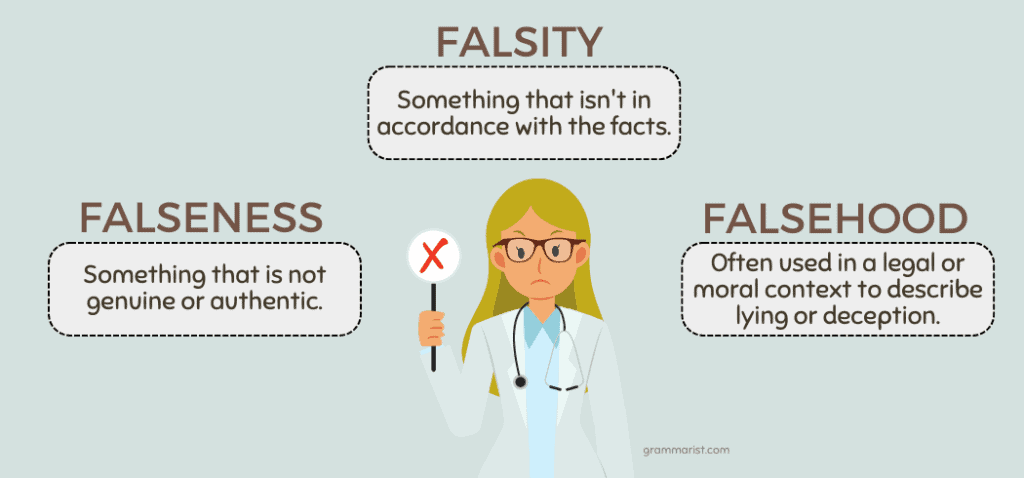Falseness, falsity, and falsehood. Aren’t these just different versions of the same meaning? Basically, yes. But they each work better in certain contexts. I’ll explain the three definitions and slight differences between falseness, falsity, and falsehood so you can use them the way they should be used.
Falseness vs. Falsity vs. Falsehood

In short, falseness is the quality or state of being false, falsity is the state of being false or untrue, and falsehood basically means a statement or belief that isn’t true or the act of lying or making false statements.
While the three words are closely related, they are used in different contexts and can carry different connotations.
- Falseness: Something that is not genuine or authentic.
- Falsity: Something that isn’t in accordance with the facts.
- Falsehood: Often used in a legal or moral context to describe lying or deception.
The Definition of Falseness
Falseness is when something has a sense of being false or not true, like something that is counterfeit or fake. It’s a feeling, an aura. Think of Monopoly money. When you look at it, the falseness is pretty evident. It’s not real.
So, What’s the Meaning of Falsity?
Falsity is a similar term, yes, but you’d use it to describe something incorrect or untrue. I know it’s a fine line between the definitions, so I’ll do my best to explain the difference.
Take this statement, for example: “The falsity of her claim was exposed during the trial.” You wouldn’t say the claim is falsity, but you could get away with saying, ‘the falseness of the claim.’
Let’s Define Falsehood
Falsehood is a noun that you’d use to describe a statement or belief that simply isn’t true. It can also mean the act of lying or making false statements. Like, if someone gave an alibi but it was proven a lie, the cops would say, “He was caught in a falsehood when his alibi was disproved.”
Some falsehood synonyms would be cover-up, fakery, fallacy, or perjury.
Sentence Examples Using the Word Falseness
- The falseness of the painting was immediately obvious to the art expert.
- The falseness of the document was exposed when it was submitted to a verification process.
- He was dismissed from his job due to the falseness of his resume.
Harbach’s generosity is both that, and a lesson in the falseness of appearances. [Seattle Times]
Falsity in a Sentence
- They exposed the statement’s falsity during the trial.
- She was charged with falsity for lying on her tax returns.
- I could see the falsity of her claim; it was so obvious.
- He was found guilty of falsity for lying under oath.
- My mother was accused of falsity for misrepresenting her qualifications when she applied for that job.
- We were shocked. The falsity of the data was discovered during the audit.
Using the Word Falsehood in a Sentence
- He was found guilty of falsehood for lying to the police.
- My company was charged with falsehood for making fake advertising claims.
- My husband was dismissed from his job due to the falsehood of his statements against co-workers.
They discovered that Twitter crowds reflexively sorted facts from falsehoods in the crisis. [Wall Street Journal]
Final Words
In a conversation that’s on the informal side, you can use all three of these words interchangeably. But for formal or written communication, I’d recommend you to be specific and use the word that best describes the situation you’re dealing with.
